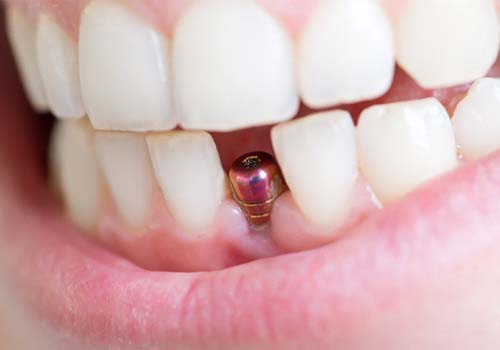
Dental Implants — San Antonio, TX
Replace Your Teeth with an Implant Specialist
When teeth are missing, your appearance is far from the only thing to be affected. With every tooth lost, your risk for future tooth loss only goes up. Furthermore, once a tooth is removed, the root comes out with it, leaving you vulnerable to long-term oral health issues that Dr. Brice would like to help you avoid. The good news is he can replace your teeth with dental implants entirely in-house. Being an implant specialist means he can complete all steps of treatment, no matter how complex your case may be. To have your first consultation to discuss dental implants in San Antonio, TX, give his dental office a call today!
Why Choose Brice Dental For Dental Implants?
- Advanced Dental Implant Technology for Precise Results
- Entire Dental Implant Treatment Completed Under One Roof
- Reasonable and Honest Prices with No Hidden Fees
What Are Dental Implants?

A dental implant is a small titanium post that can be inserted into the jawbone to replace a missing tooth’s roots. However, many people also use the words “dental implant” to refer to the entire replacement tooth, which includes the abutment and final restoration as well. The abutment sits on top of the implant post and fastens the restoration (a crown, bridge, or denture) firmly into place. Unlike other tooth replacement methods, dental implants are designed to integrate with existing bone and gum tissue, providing a long-term solution unlike any other. That’s why most dentists consider dental implants to be the new gold standard of tooth replacement!
The 4 Step Dental Implant Process

Dental implant treatment is broken down into four distinct parts. This includes the planning stage where Dr. Brice confirms the number and type of teeth being replaced, the surgical portion where the implants are actually placed, the attachment of the abutment, and the placement of the permanent restoration. Thanks to Dr. Brice’s expertise, we perform each of these steps in-office for your convenience. Keep in mind that the length of your treatment will vary depending on the complexity of your needs. For example, needing a single implant placed will be far less time-consuming than placing a three-crown, implant-retained bridge.

Initial Dental Implant Consultation
The initial consultation you will schedule with Dr. Brice will require you to spend ample time allowing him to examine your smile as well as formulate a personalized treatment plan. From looking at your teeth to reviewing digital X-Rays and a 3D high-resolution image of your oral and facial structures captured by an advanced cone beam scanner, he will determine if you are a qualified candidate before moving forward with a designated treatment plan.

Dental Implant Surgery
If you do not require a bone graft or another pre-implant dental procedure (i.e. tooth extraction), Dr. Brice will perform the implant surgical procedure in-house, allowing you to remain with a familiar team from start to finish. During this process, your implant dentist in San Antonio will make one or more small incisions in your gums before placing each implant into the jawbone. After closing the gum tissue, you will return home to recover for 3-6 months.

Dental Implant Osseointegration/ Abutment
During your recovery phase at home, osseointegration must occur. This is the process in which your dental implants in San Antonio will fuse with the bone and surrounding tissues. You must allow enough time to pass before moving on to the next phase of treatment, which is the placement of your metal abutment(s). Once you are fully healed, you will have your abutments put into place, which are small connector appliances that fit on top of the implant and connect to the custom restoration, holding it in place.

Delivery of Dental Implant Restorations
After receiving your metal abutments, you will receive the final restoration. This can be a dental crown, implant bridge, or implant denture. The number of implants you receive will determine the type of restoration you will have created. Once it is ready for placement, Dr. Brice and our team will examine the prosthetic to ensure it looks natural before securing it into place, making sure it fits properly and is comfortable in your mouth.
Benefits of Dental Implants

There’s a reason that dental implants are quickly becoming the most popular way to replace missing teeth. Several reasons in fact! This revolutionary tooth loss solution is the next best thing to natural teeth, and as such, offers a wide variety of benefits that other options like dentures and dental bridges simply can’t. Read on as we go over some of the most noteworthy ways dental implants can improve your confidence, health, and quality of life!

Day-to-Day Benefits
- Eat all your favorite foods once again: Since they integrate directly into your jawbone, dental implants allow you to eat all the foods you couldn’t before with dentures or missing teeth. You can comfortably and confidently eat all your favorite foods like steak, apples, nuts, and anything else on your plate!
- Keep your new smile healthy and clean easily: Dental implants can be cared for just like natural teeth! Taking care of them is as easy as regular brushing with a soft-bristled toothbrush, routine flossing, and biannual dental checkups. Unlike dentures or dental bridges, you won’t need any special cleaning tools or solutions!
- Smile with absolute confidence: Dentures and dental bridges naturally begin to lose their close fit over time, causing them to feel loose, unstable, and to fall out at inconvenient times. With dental implants, you’ll never have to worry about this. Their firm foundation in your jawbone means you can smile with absolute confidence knowing they’ll stay firmly in place.

Health Benefits
- Maintain a strong, healthy jawbone: After tooth loss, it’s natural for the jawbone to begin to shrink away. Dental implants are just like natural tooth roots in that they stimulate the bone tissue every time you chew, preventing jawbone deterioration.
- Protect your gums and remaining teeth: Dentures rest on top of the gums and occasionally cause sores. Dental bridges require the alteration of healthy teeth, leaving them more vulnerable to sensitivity and decay. Dental implants are self-supporting, making them the healthiest choice for the rest of your smile.
- Prevent future tooth loss & aged facial features: The deterioration of jawbone material that usually comes after tooth loss can impact nearby teeth, causing them to become loose and fall out. Plus, jawbone shrinkage changes the position of facial bones to give you a sunken, aged appearance. Dental implants keep the jawbone strong, which in turn will help you keep your remaining teeth and your youthful looks!

Long-Term Benefits
- Enjoy long-term success: Dental implants boast an amazing success rate of 95% even 10 years after placement. While dentures and dental bridges need to be replaced every five to seven years, dental implants are designed to last for decades. In fact, with the proper care, most patients can easily count on their dental implants to last a lifetime!
- Save thousands of dollars in the long run: The longer lifespan of dental implants isn’t just convenient, it can also save you thousands of dollars in the long run! Dentures and dental bridges need to be repaired or replaced every several years, which can become quite pricey over time. On the other hand, the one-time upfront cost of dental implants can last you a lifetime, making them an investment that can pay for itself!
Who Dental Implants Can Help

No matter how many teeth you’re missing, dental implants can rebuild your complete, confident smile. However, you may not be an ideal candidate for them initially. During you consultation, we’ll carefully inspect your mouth and jaw to see if there are any hidden problems that could potentially cause your dental implants to fail. Once any issues have been addressed, we’ll help you pick out the right kind of restoration for your smile.

Who Is a Good Candidate for Dental Implants?
You’ll typically need three things before moving ahead with your dental implant treatment. First, it’s important that you’re in good enough health to undergo minor surgery to have your dental implants place. Secondly, your mouth needs to be free of issues like cavities or gum disease, which can threaten the success of your dental implants. Thirdly, you’ll need to have adequate jawbone density to support your dental implants. If needed, we can help you get ready for your brand-new smile with preliminary treatments like periodontal therapy, tooth extractions, or bone grafting.
Once you’re ready for treatment, we’ll determine how many implants you’ll need and what type of restoration depending on the extent of your tooth loss.
Missing 1 Tooth
Replacing individual teeth requires one implant post, a single abutment, and an implant-retained porcelain crown. Dr. Brice always uses tooth-colored restorations to ensure the most natural-looking tooth replacement possible. Once the implant has had time to fully heal inside of the jaw, the abutment and restoration can be placed.
Missing Multiple Teeth
Instead of removing enamel from existing teeth so they can hold a dental bridge, a pair of dental implants can be used to hold a three- or four-crown bridge. The crowns on either end of the bridge attach to the implants, while the crowns in the center fill the gap in your smile.
Missing All Teeth
Whether you’re missing teeth on opposite sides of your mouth or an entire arch, a series of implants can be placed to hold a full or partial implant denture. We can even place a temporary denture the same day as your implant surgery through the All-on-4 treatment.
Understanding the Cost of Dental Implants

While the price of dental implants can be a bit intimidating at first, it’s important to keep in mind that your treatment is unlikely to cost the same as any other patient’s. For example, if you only intend to replace one tooth and don’t need preparatory treatments (i.e. bone grafts, gum therapy), then your treatment will be substantially less than someone who needs to replace multiple teeth or have additional care performed to make implants viable. Additionally, there are few tooth replacements more cost-effective than dental implants thanks to their longevity, functionality, reliability, and natural esthetics. This makes them a great long-term investment.

Types of Dental Implants
Dental implants remain one of the most versatile tooth replacement options available. Because they are capable of replacing one tooth as well as a full arch of teeth, this makes them a popular solution among individuals with missing teeth.
- Single Tooth Implant– As the least expensive option, replacing a single tooth requires the use of one titanium implant (post), a metal abutment, and a custom-made dental crown.
- Implant Bridge– Considered to be a step up in expense from the single tooth implant, an implant bridge requires two titanium posts, corresponding abutments, and a customized dental bridge that fuses three or more dental crowns.
- Implant-Retained Denture– As the most expensive option, the implant-retained denture is actually more cost-effective when compared to traditional dentures. Although it requires between 4 and 6 dental implants, this restorative solution will not require replacements after 5-7 years. Instead, your implants can remain in place for a lifetime with proper care and maintenance.

Stages of Dental Implant Treatment
Knowing that part of your cost is determined based on the number of implants you will need, you will also discover that each stage of dental implant treatment incurs its own fee.
- Initial Consultation:Scheduling a consultation is necessary. Why? Because it allows Dr. Brice to examine your oral cavity and determine whether you are a qualified candidate for this type of procedure. Digital X-Rays and specialized equipment are used to obtain a complete view of your facial structure, allowing him to better determine how best to treat your missing teeth.
- Pre-Implant Dental Work: If during the consultation it is discovered that your jawbone is not strong enough, it will be necessary for you to undergo a bone graft or sinus lift. This additional procedure not only requires additional time, but it also incurs an added cost to the overall process of receiving dental implants.
- Surgical Placement:Although additional costs can arise should your dentist refer you to someone else for implant placement, Dr. Brice is an implant specialist who will remain with you throughout the entire process, including placing your implants himself.
- Custom Restoration: The final aspect of your dental implant placement is the custom restoration you will receive. While a single dental crown will be much less expensive than a denture, this is simply another part of the overall cost associated with your treatment.

Are Dental Implants Worth the Investment?
If you understand the benefits that come with this type of tooth replacement solution, you will agree that they are certainly worth the investment. Yes, the upfront cost is higher than traditional restorative methods; however, dental implants are more cost-effective because of their durability and longevity. When you consider how much money you could spend over the years having your prosthetic relined, readjusted, or replaced, it can end up costing you much more in the long run. Dental implants, with proper care, are designed to last a lifetime.

Does My Dental Insurance Cover Dental Implants?
While this question is often asked by most patients, the answer is unfortunately not clear-cut. Every dental insurance company is different, which means you will need to speak with a representative to determine if you are covered for dental implants. If you are unsure of which questions to ask, our team will be happy to work on your behalf.
Even if your insurance company does not cover the cost of placing your implants, you may be surprised to learn that other aspects of treatment (i.e. consultation, restoration, or any pre-implant dental work) might be covered.
Maintaining & Caring For Your Dental Implants

It’s true that dental implants are capable of lasting for decades and even a lifetime, but that truly depends on how well you take care of them day-to-day. It’s true that the restoration attached to the implant cannot develop decay since porcelain is an inorganic material. However, you’ll still need to stay on top of daily oral hygiene as well as keep a few other maintenance tips in mind. These can easily be kept as a reference below for your convenience.

Make Oral Hygiene a Priority
Treating your dental implant just like any other tooth is very important, especially when it comes to at-home brushing and flossing. Brush twice a day with a fluoridated toothpaste to keep dental plaque to a minimum. Use floss to remove plaque and loosen food debris from in between your teeth as well as underneath your dental implant’s restoration. For an extra thorough cleaning, it’s worth investing in an oral rinse you enjoy using. If traditional flossing proves to be too difficult, floss picks or water flossers can also be helpful.

Eat a Healthy Diet
You don’t want to expose your dental implant to excessive amounts of sugar and starch. While it’s fine to indulge every once in a while, you’ll want to keep your diet relatively balanced as well. For example, you should be including fruits, vegetables, dairy products, and proteins into your meals as well. Look for foods that contain vitamins and minerals that are conducive to oral health, such as calcium, phosphorus, potassium, vitamin A, vitamin C, and vitamin D, to name a few.

Break Bad Habits
Dental implants are not indestructible, which means they can become damaged if used incorrectly. Just like how you wouldn’t use your natural teeth to perform certain tasks like biting your fingernails, chewing on pens and pencils, or opening packages or bottles, the same logic should apply to your dental implants. Failing to discontinue these bad habits can shorten the lifespan of your dental implants and even trigger a dental emergency. If you are a smoker or use tobacco of any kind, now is a good time to quit the habit completely.

Protect Your Dental Implants
If you enjoy playing in active sports, protective gear is essential to avoiding injury. There’s no exception when it comes to your smile, especially during activities where the risk for sudden impact is considerably high. For example, if you enjoy football, basketball, wrestling, hockey, karate, or similar activities, investing in a mouthguard is ideal, particularly one customized to your mouth specifically. These offer the best long-term protection and comfort compared to cheaper, store-bought options.

Schedule Regular Dental Checkups
A regular exam and cleaning every six months gives Dr. Brice a chance to confirm your dental implant is still healthy and no complications have developed since it was placed. His hygienist can also carefully clean the attached restoration of any plaque or tartar that was missed during at-home care.
Dental Implant Post-Op Instructions

Unlike traditional tooth replacement options, dental implants are placed via a minor oral surgery. This means that you’ll need to spend a few days recovering afterwards. Before you leave our office, we’ll give you printed out post-op instructions that are tailored to your specific needs. These instructions will cover everything from what to do directly after your surgery to how to brush your teeth for the next several days. For your convenience, we’ve also covered some of this information below.

What to Do Directly After Dental Implant Surgery
When you return home after your dental implant surgery, you should plan on resting for at least the remainder of the day. Some patients will feel up for returning to their normal activities such as work and school within a day or two, but it’s also completely normal to rest for several days longer. In these first few days, it’s essential that you remember to:
- Take your prescribed pain medication as instructed
- Get plenty of rest and avoid strenuous activities
- Use an ice pack, cold compress, or cold foods and drinks to minimize swelling and discomfort
- Stay hydrated
- Avoid using straws and spitting forcefully

Common Side-Effects When Recovering from Dental Implant Placement
As with any oral surgery, there are several common side effects you can expect. In the first several days, it’s normal to experience occasional light bleeding. Your face and mouth will likely stay somewhat swollen for a week or more. Discomfort as your body heals is normal as well, but it should be easy to manage with the recommended pain relievers. If your side effects do not seem to be getting better, or you think they may be getting worse, don’t hesitate to give us a call right away.

Your Diet After Dental Implant Surgery
To ensure that the food you eat doesn’t disturb the surgical site, it’s important that you adjust your diet in the weeks following your dental implant surgery. You should initially stick to soft, nutritious foods until you begin to feel well enough to gradually add harder and crunchier foods into your diet. A few soft foods we recommend starting off with include smoothies, yogurt, applesauce, mashed potatoes, pasta, and ice cream.

Post-Op Health & Oral Hygiene
Practicing great oral hygiene after your dental implant surgery is essential for keeping infection at bay as your mouth heals. However, you’ll need to take a few extra precautions to ensure your normal dental habits don’t irritate the surgical site. Here are a few things to keep in mind:
- Resume brushing your teeth for two minutes twice a day the day after your dental implant surgery, but be very gentle while brushing around your dental implant.
- Rinse with mouthwash or plain water regularly to keep the area clean, but do not use mouthwashes that contain alcohol.
- Avoid spitting forcefully.

What to Do After Your New Teeth Are Attached
Once your custom-made crown, bridge, partial, or denture is created, you’ll return to our office to have it anchored onto your dental implants. This process shouldn’t cause discomfort, and we’ll check that your bite is comfortable before you leave. For the first few days after having your new teeth placed, you may feel a slight amount of sensitivity in your gums. However, this should be easy to manage with over-the-counter pain relievers and fade on its own within just a few days.
Dental Implant FAQs
Does Getting Dental Implants Hurt?
Before the dental implant procedure, your mouth will be numbed with a local anesthetic. Your jawbone doesn’t have very many nerve endings, and you will likely be sedated, so the surgery shouldn’t cause you any pain. However, your mouth may be sore for a few days after the procedure. Take any prescribed or over-the-counter pain medication as directed. Using a cold compress can also help to numb some of the discomfort. If the discomfort worsens instead of improving after two to three days, give us a call and let us know what’s going on.
What Can Cause Dental Implants to Fail?
Dental implant failures are very uncommon, but they can occur for a couple of different reasons, including peri-implantitis and failed osseointegration. Peri-implantitis is a form of gum disease that develops from poor oral hygiene and can damage the bone and gums supporting the implant. Failed osseointegration takes place when the implant does not successfully fuse with the jawbone. Other causes of dental implant failure include bruxism, tobacco use, poor oral hygiene, certain medications, radiation to the head and neck, and certain health conditions. Thankfully, minimizing your risk of dental implant failure is easy! Make sure to practice great oral hygiene and protect your teeth from bad habits. If you begin to notice redness, swelling, looseness, or pain coming from your dental implant, give us a call right away so we can help.
Am I Too Old to Get Dental Implants?
There is no upper age limit of dental implants once your jawbone is fully developed. Your ability to get dental implants depends on the health of your gums, jaw, and lifestyle choices. Certain medications and medical issues can also affect your ability to get dental implants. Seniors may be more likely to have other health problems that complicate dental implant treatment, but there isn’t an age that is “too old” to get implants.
Do Dental Implants Feel Natural?
Once the dental implants are placed in the jawbone and heal, they should feel just like your natural teeth. Because the implants don’t have any nerve endings, any sensations that you feel in the area are coming from the gums that surround the implants.
Do I Need a Bone Graft Before Getting Dental Implants?
A bone graft involves transplanting a piece of bone tissue to the jawbone in order to strengthen it so it can accommodate dental implants. The jawbone often atrophies after teeth have been lost because the tooth’s roots no longer stimulate it when chewing or biting. During your initial consultation, detailed scans will be taken of your jaw area in order to determine whether or not you’ll need a bone graft before getting dental implants.
How Long Do Dental Implants Last?
This really depends on your maintenance and dental hygiene habits. While dental implants haven’t been around for an incredibly long time, studies have shown that their lifespan can last for up to 30 years, and in some cases, even longer with good oral hygiene. This includes brushing your teeth twice a day, flossing daily, and visiting your dentist in San Antonio every six months for routine checkups and cleanings. Dr. Brice will provide you with tips and advice on how to get the most out of your implants after your treatment is complete.
How Successful are Dental Implants?
Dental implants boast an incredibly high success rate of up to 95 percent after five years of placement. It’s rare for them to fail, but in cases that are more complex, like with a patient that has poor hygiene habits or has habits that can compromise the health of their implants, it’s possible. That’s why Dr. Brice will ask you about your health history during your consultation, ensuring that you’re able to enjoy your newly restored smile for as long as possible.
How Long Does It Take to Recover From Dental Implant Surgery?
In most cases, patients are able to carry on with their normal daily activities and errands the day following their surgery. However, it’s a good idea to avoid strenuous exercise and activity for the first week because it could slow the healing process. Patients rarely feel discomfort afterwards, too, allowing you to go about your daily life with minimal pain. If you do experience this, in most cases, taking an over the counter medication recommended by our team can usually tackle your post-operative symptoms.
Can I Get Dental Implants if I Smoke?
If you smoke, it doesn’t mean that you’ll automatically be ruled out for dental implants in San Antonio. However, it’s important to keep in mind that those who smoke and chew tobacco, including vaping, are at a higher risk of implant failure. This is because it can slow down the healing process by limiting blood flow to the mouth, ultimately preventing the implants from being able to fuse with your jawbone. We recommend that smokers quit at least two weeks before their procedure, all the way to three months following it. If you have any additional concerns, please don’t hesitate to schedule a consultation so we can speak with you about them in more depth.
I Need a Dental Checkup & Cleaning I am Concerned About Bleeding Gums I Have a Cavity or Broken Tooth I am Missing One or More Teeth I am Unhappy with My Smile I am Afraid/Nervous of the Dentist I am in Pain & Need Help I Want Whiter Teeth I Need Full Mouth Reconstruction View Our Services